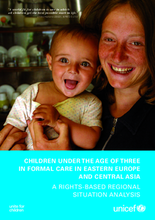Through a comprehensive statistical analysis and literature review, this UNICEF report provides a child rights-based up-to-date review of the situation of children under the age of three in formal care in countries of Central and Eastern Europe and the Commonwealth of Independent States (CEECIS). It examines regional and country level trends in the use of institutional care and family based alternative care options, in particular foster care.
While major progress has been achieved in the reform of childcare systems in the CEECIS region ever since the 1990s, analysis of statistical data from the TransMonEE Database that contains government data from 21 countries in the CEECIS region shows that reform has not yet been translated into the capacity of social protection systems to prevent family separation. It is estimated that there are more than 600,000 children in institutional care in the region and that the rate of children in formal care today is higher than it was at the beginning of the transition from the Soviet period.
The report finds that the rate of children under the age of three in institutional care in CEECIS countries has been slowly decreasing since the year 2000 but that this decline has been uneven. Three countries (Bosnia and Herzegovina, Tajikistan, and The former Yugoslav Republic of Macedonia) are experiencing an alarming increase in the rates of institutionalization of young children, and four countries (Belarus, Bosnia and Herzegovina, Bulgaria, and Russian Federation), have extremely high rates of institutionalization of children under the age of three. In the case of Russian Federation, the country is totalizing half of all children under the age of three in institutions in the whole region.
Across the region, only 2 to 5 per cent of children under the age of three in formal care are orphans. All other children deprived of parental care still have one or two parents alive but, in most cases, no support was provided to avoid family separation. In addition, foster care, which is the main alternative to institutionalization for young children who cannot live (either temporarily or permanently) with their parents or extended family, is barely used for children under the age of three. Indeed, in at least six CEECIS countries (Armenia, Azerbaijan, Kazakhstan, Kyrgyzstan, Tajikistan and Turkmenistan), no systems of family foster care for children under the age of three have been developed. In at least ten other countries (Albania, Belarus, Bosnia and Herzegovina, Bulgaria, Montenegro, Republic of Moldova, Russian Federation, TFYR of Macedonia, Ukraine, and Uzbekistan), such systems are only at the very early stages of their development.
The report reviews the evidence on the immediate and root causes behind the separation of children from their families, highlights promising interventions and describes the steps states and other actors should take in order to prevent family separation, enable family reunification, provide adequate care and protection and, ultimately, make the institutionalization of children under the age of three a thing of the past.
©UNICEF

